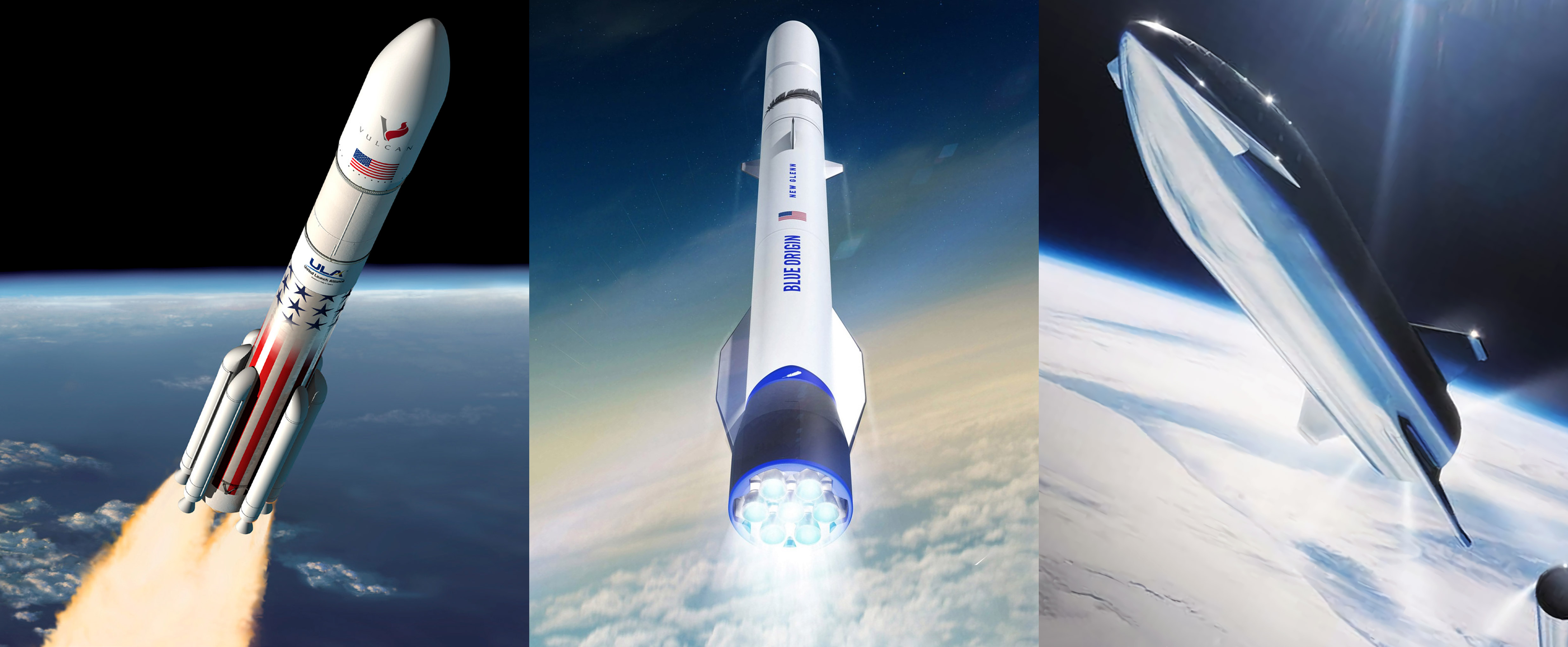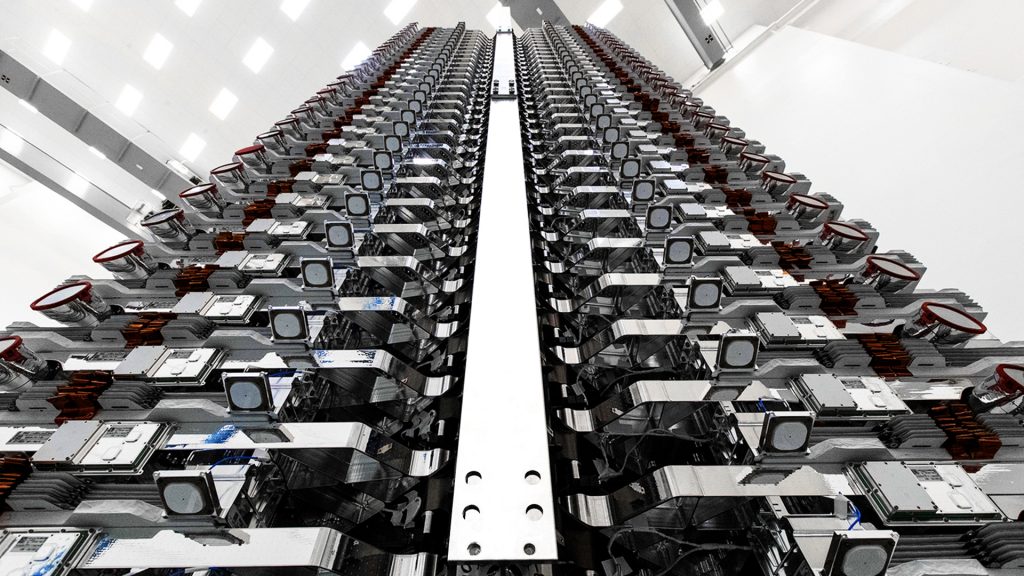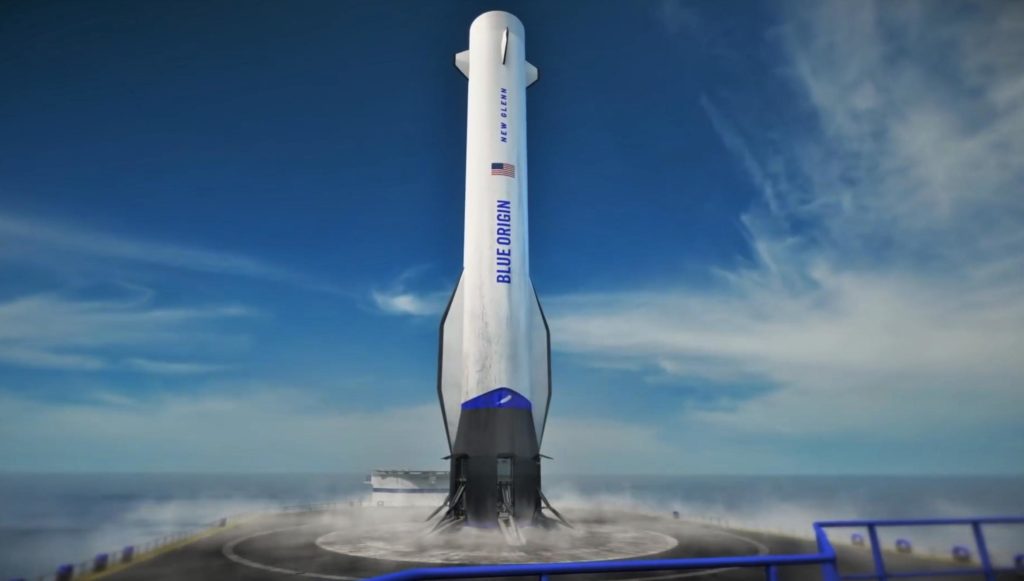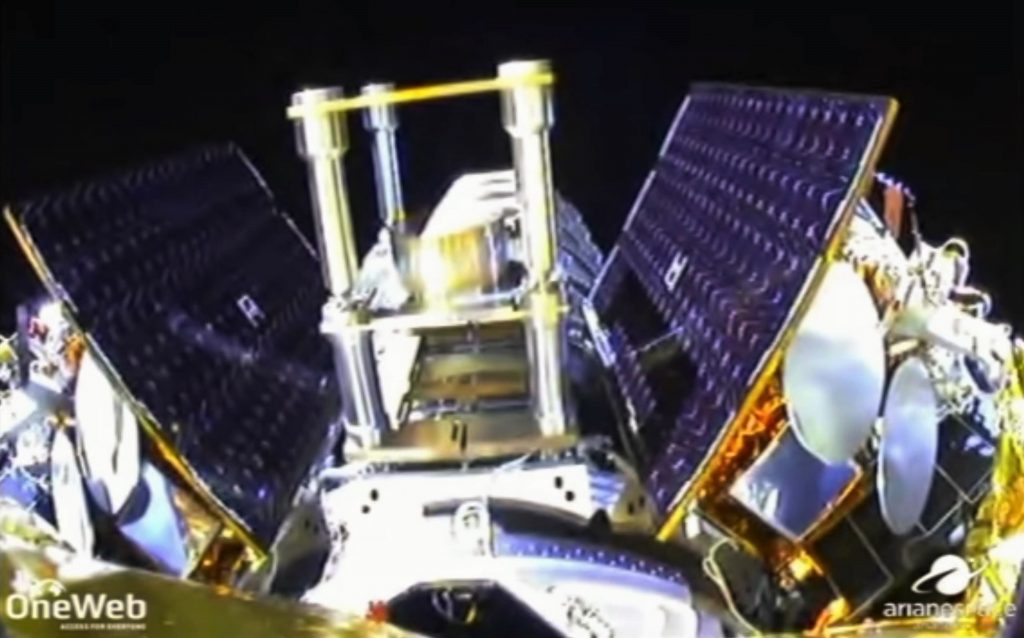

News
SpaceX COO offers harsh critique of Falcon 9, Starlink, and Starship’s competitors
SpaceX President Gwynne Shotwell says that the company’s Starlink internet constellation is years ahead of competition from OneWeb and Amazon. A step further, the executive also voiced several unprecedently harsh critiques of Jeff Bezos’ Blue Origin and Boeing and Lockheed Martin (ULA).
SpaceX President and Chief Operating Officer Gwynne Shotwell has been as busy as ever and has attended numerous major events over the last few weeks, often speaking with an unprecedented level of candor. The famous SpaceX executive repeatedly indicated that competitors have over-promised and under-delivered and, as a result, are years behind SpaceX’s own Starlink constellation. SpaceX has already launched 60 prototype satellites and has hundreds more on the way as part of a bid to kick off a busy period of “v1.0” satellite.
SpaceX intends to launch has many as 24 dedicated Starlink missions next year, equating to 60 satellites launched every two or so weeks. Meanwhile, the company is in the late stages of preparing to mass-produce “user terminals” and ground stations with the hope of delivering internet service to customers internet as early as mid-2020.

Starlink, OneWeb, and Project Kuiper
Shotwell was especially critical of megaconstellation competitors OneWeb and Amazon, the latter of which began hiring just a few months ago for a several-thousand-satellite constellation known as Project Kuiper. During an October 25th Q&A session with billionaire Ron Baron at the Baron Fund’s annual Investment Conference, Shotwell was uncharacteristically candid about the spaceflight industry outside of SpaceX’s doors, pointing to Jeff Bezos’s Blue Origin and the United Launch Alliance as prime examples of the many pitfalls of traditional aerospace methods.
Shotwell, on SpaceX's competitors and why other companies haven't built and landed orbital rockets: "Boeing and Lockheed like their cushy situation."— Michael Sheetz (@thesheetztweetz) October 25, 2019
She responded by crediting the hard work of SpaceX engineers and the often ambitious timelines set forth by company CEO Elon Musk, stating that, “I don’t think there’s a motivation or a drive there.” She explained that she believes that “engineers think better when they’re pushed hardest to do great things in a very short period of time, with very few resources. Not when you have twenty years.” This is a bit of a brutal take given that SpaceX is infamous for offering an often brutally hostile work environment and some of the worst salaries in the industry, but it’s nearly impossible to deny that SpaceX’s list of achievements is essentially unrivaled.
Baron: Why hasn't Bezos been doing this? He's spending lots of money.
Shotwell: They're two years older than us and they've yet to reach orbit. They get $1 billion of "free money" each year but I think engineers work better when they're pushed.— Michael Sheetz (@thesheetztweetz) October 25, 2019
Discussing Blue Origin, Shotwell pulled no punches, stating that “they’ve got a ton of money and they’re not doing a lot.” While both companies – SpaceX and Blue Origin – have remained private and exist in large part thanks to their wealthy owners, SpaceX has pursued commercial relevance and become wildly successful. On the other hand, Blue Origin – despite being two years older – would likely lose all forward momentum or fold outright if owner Jeff Bezos were to cease bankrolling the spaceflight company.
Blue Origin is currently developing a large, reusable, orbital-class rocket known as New Glenn and could eventually become SpaceX’s only serious competition, but the rocket’s first launch is unlikely to occur before H2 2021 or 2022.

Simultaneously, Amazon recently revealed Project Kuiper, a slightly modified version of SpaceX’s Starlink constellation that is being lead by ex-Starlink executives fired by Elon Musk in June 2018. Project Kuiper, however, has only just begun and is likely at least 3-5 years away from beginning orbital testing, let alone providing any sort of service to customers.
Shotwell also addressed a new competitor in the large-scale satellite constellation market, OneWeb. During her talk with Baron, Shotwell bluntly warned potential investors to steer clear of the company. She boasted about SpaceX’s Starlink satellites, stating that they are “17 times better per bit”, a reference to Starlink’s greater per-satellite bandwidth, and cautioned that “if you’re thinking about investing in OneWeb, I would recommend strongly against it. They fooled some people who are going to be pretty disappointed in the near term.”

OneWeb later provided a follow up to CNBC reporter Michael Sheetz stating “we are not in the business of commenting on competitors. OneWeb’s satellites and constellation design are tested, market leading and we are excited to start our monthly launches soon and to start delivering much needed connectivity to people everywhere.” In reality, OneWeb and executives like Greg Wyler comment on competitors all the time, they just rarely put all their cards on the table.
Regardless, Shotwell’s streak of candor appears to have no end in sight. It remains to be seen whether her move towards uncharacteristically vitriolic public comments is a smart strategy, but she is undoubtedly making waves.
Check out Teslarati’s Marketplace! We offer Tesla accessories, including for the Tesla Cybertruck and Tesla Model 3.
News
Tesla begins Robotaxi certification push in Arizona: report
Tesla seems serious about expanding its Robotaxi service to several states in the coming months.

Tesla has initiated discussions with Arizona transportation regulators to certify its driverless Robotaxi service in the state, as per a recent report from Bloomberg News. The move follows Tesla’s launch of its Robotaxi pilot program in Austin, Texas, as well as CEO Elon Musk’s recent comments about the service’s expansion in the Bay Area.
The Arizona Department of Transportation confirmed to Bloomberg that Tesla has reached out to begin the certification process for autonomous ride-sharing operations in the state. While details remain limited, the outreach suggests that Tesla is serious about expanding its driverless Robotaxi service to several territories in the coming months.
The Arizona development comes as Tesla prepares to expand its service area in Austin this weekend, as per CEO Elon Musk in a post on X. Musk also stated that Tesla is targeting the San Francisco Bay Area as its next major market, with a potential launch “in a month or two,” pending regulatory approvals.
Tesla first launched its autonomous ride-hailing program on June 22 in Austin with a small fleet of Model Y vehicles, accompanied by a Tesla employee in the passenger seat to monitor safety. While still classified as a test, Musk has said the program will expand to about 1,000 vehicles in the coming months. Tesla will later upgrade its Robotaxi fleet with the Cyercab, a two-seater that is designed without a steering wheel.
Sightings of Cybercab castings around the Giga Texas complex suggests that Tesla may be ramping the initial trial production of the self-driving two-seater. Tesla, for its part, has noted in the past that volume production of the Cybercab is expected to start sometime next year.
In California, Tesla has already applied for a transportation charter-party carrier permit from the state’s Public Utilities Commission. The company is reportedly taking a phased approach to operating in California, with the Robotaxi service starting with pre-arranged rides for employees in vehicles with safety drivers.
News
Tesla sets November 6 date for 2025 Annual Shareholder Meeting
The automaker announced the date on Thursday in a Form 8-K.

Tesla has scheduled its 2025 annual shareholder meeting for November 6, addressing investor concerns that the company was nearing a legal deadline to hold the event.
The automaker announced the date on Thursday in a Form 8-K submitted to the United States Securities and Exchange Commission (SEC). The company also listed a new proposal submission deadline of July 31 for items to be included in the proxy statement.
Tesla’s announcement followed calls from a group of 27 shareholders, including the leaders of large public pension funds, which urged Tesla’s board to formally set the meeting date, as noted in a report from The Wall Street Journal.
The group noted that under Texas law, where Tesla is now incorporated, companies must hold annual meetings within 13 months of the last one if requested by shareholders. Tesla’s previous annual shareholder meeting was held on June 13, 2024, which placed the July 13 deadline in focus.
Tesla originally stated in its 2024 annual report that it would file its proxy statement by the end of April. However, an amended filing on April 30 indicated that the Board of Directors had not yet finalized a meeting date, at least at the time.
The April filing also confirmed that Tesla’s board had formed a special committee to evaluate certain matters related to CEO Elon Musk’s compensation plan. Musk’s CEO performance award remains at the center of a lengthy legal dispute in Delaware, Tesla’s former state of incorporation.
Due to the aftermath of Musk’s legal dispute about his compensation plan in Delaware, he has not been paid for his work at Tesla for several years. Musk, for his part, has noted that he is more concerned about his voting stake in Tesla than his actual salary.
At last year’s annual meeting, TSLA shareholders voted to reapprove Elon Musk’s compensation plan and ratified Tesla’s decision to relocate its legal domicile from Delaware to Texas.
Elon Musk
Grok coming to Tesla vehicles next week “at the latest:” Elon Musk
Grok’s rollout to Tesla vehicles is expected to begin next week at the latest.

Elon Musk announced on Thursday that Grok, the large language model developed by his startup xAI, will soon be available in Tesla vehicles. Grok’s rollout to Tesla vehicles is expected to begin next week at the latest, further deepening the ties between the two Elon Musk-led companies.
Tesla–xAI synergy
Musk confirmed the news on X shortly after livestreaming the release of Grok 4, xAI’s latest large language model. “Grok is coming to Tesla vehicles very soon. Next week at the latest,” Musk wrote in a post on social media platform X.
During the livestream, Musk and several members of the xAI team highlighted several upgrades to Grok 4’s voice capabilities and performance metrics, positioning the LLM as competitive with top-tier models from OpenAI and Google.
The in-vehicle integration of Grok marks a new chapter in Tesla’s AI development. While Tesla has long relied on in-house systems for autonomous driving and energy optimization, Grok’s integration would introduce conversational AI directly into its vehicles’ user experience. This integration could potentially improve customer interaction inside Tesla vehicles.
xAI and Tesla’s collaborative footprint
Grok’s upcoming rollout to Tesla vehicles adds to a growing business relationship between Tesla and xAI. Earlier this year, Tesla disclosed that it generated $198.3 million in revenue from commercial, consulting, and support agreements with xAI, as noted in a report from Bloomberg News. A large portion of that amount, however, came from the sale of Megapack energy storage systems to the artificial intelligence startup.
In July 2023, Musk polled X users about whether Tesla should invest $5 billion in xAI. While no formal investment has been made so far, 68% of poll participants voted yes, and Musk has since stated that the idea would be discussed with Tesla’s board.
-

 Elon Musk1 week ago
Elon Musk1 week agoTesla investors will be shocked by Jim Cramer’s latest assessment
-

 Elon Musk3 days ago
Elon Musk3 days agoElon Musk confirms Grok 4 launch on July 9 with livestream event
-

 Elon Musk15 hours ago
Elon Musk15 hours agoxAI launches Grok 4 with new $300/month SuperGrok Heavy subscription
-

 News7 days ago
News7 days agoTesla Model 3 ranks as the safest new car in Europe for 2025, per Euro NCAP tests
-

 Elon Musk2 weeks ago
Elon Musk2 weeks agoA Tesla just delivered itself to a customer autonomously, Elon Musk confirms
-

 Elon Musk1 week ago
Elon Musk1 week agoxAI’s Memphis data center receives air permit despite community criticism
-

 Elon Musk2 weeks ago
Elon Musk2 weeks agoTesla’s Omead Afshar, known as Elon Musk’s right-hand man, leaves company: reports
-

 News2 weeks ago
News2 weeks agoXiaomi CEO congratulates Tesla on first FSD delivery: “We have to continue learning!”

















